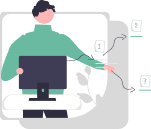When it comes to housing, there's a perennial debate: buying a home or renting a property. Both options offer unique advantages and come with their own set of considerations. The choice between homeownership and renting largely depends on your lifestyle, financial situation, and long-term goals. In this comprehensive guide, we'll walk you through the pros and cons of each, helping you make an informed decision.
Buying a Home
Pros:
-
Investment: Owning a home is often seen as a long-term investment. Over time, your property can appreciate in value, potentially providing a return on your investment when you sell.
-
Stability: Homeownership offers a sense of stability and security. You have control over your living space, and you don't have to worry about rent increases or lease renewals.
-
Equity: As you pay down your mortgage, you build equity, which can be tapped into for future financial needs or used to upgrade your home.
Cons:
-
Financial Commitment: Buying a home requires a substantial financial commitment. You'll need a down payment, monthly mortgage payments, property taxes, and maintenance costs.
-
Responsibility: You're responsible for all maintenance and repairs, which can be costly and time-consuming.
-
Market Risks: The real estate market can be unpredictable. Your home's value may not always appreciate as expected, and you may face a loss if you have to sell during a market downturn.
Renting a Property
Pros:
-
Flexibility: Renting offers greater flexibility. You can easily move when your lease is up, making it suitable for those who aren't settled in one location.
-
Lower Initial Costs: Renting typically has lower upfront costs, such as security deposits, and you're not tied to a long-term financial commitment.
-
Less Responsibility: Landlords are responsible for property maintenance and repairs, so you won't be burdened with those costs or tasks.
Cons:
-
No Equity Building: Rent payments do not build equity, meaning you won't benefit from property appreciation over time.
-
Rent Increases: Your rent can go up each time your lease is renewed, potentially making it more expensive in the long run.
-
Limited Control: As a renter, you have limited control over the property. You may not be allowed to make certain modifications or personalize the space to your liking.
In summary, the decision to buy or rent depends on your financial situation, lifestyle, and future goals. If you value stability, equity building, and the ability to make a long-term investment, homeownership may be the right choice. On the other hand, if you prioritize flexibility, lower initial costs, and less responsibility, renting could be more suitable.
Remember to carefully assess your financial readiness for homeownership, including your ability to cover the down payment and ongoing expenses. Additionally, consider your long-term plans and whether you're ready to commit to a specific location. Ultimately, the choice between buying and renting is a personal one, and there is no one-size-fits-all answer. Evaluate your priorities and make the decision that aligns best with your unique circumstances and goals.






